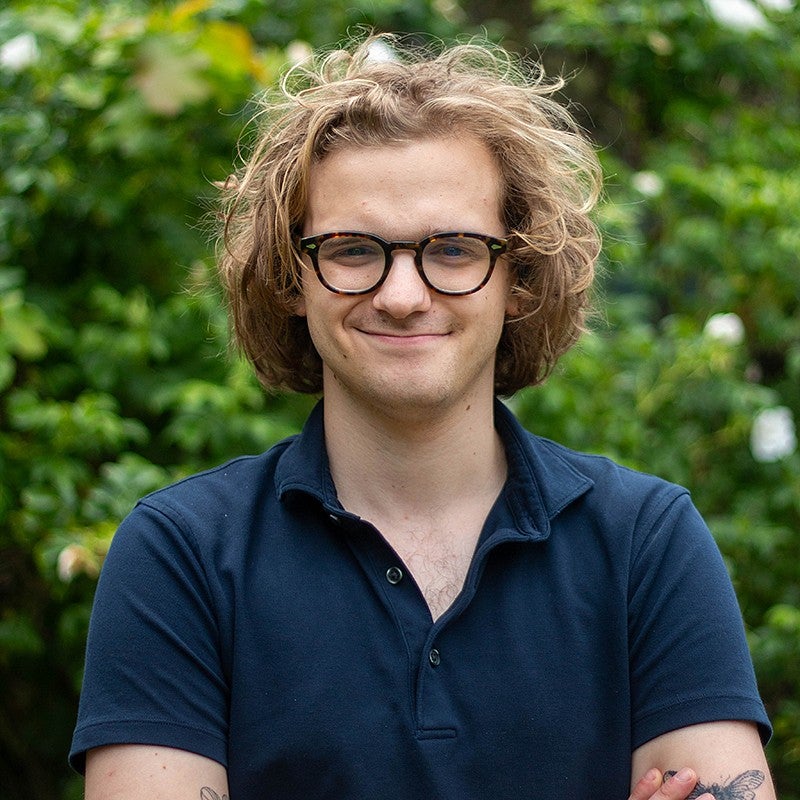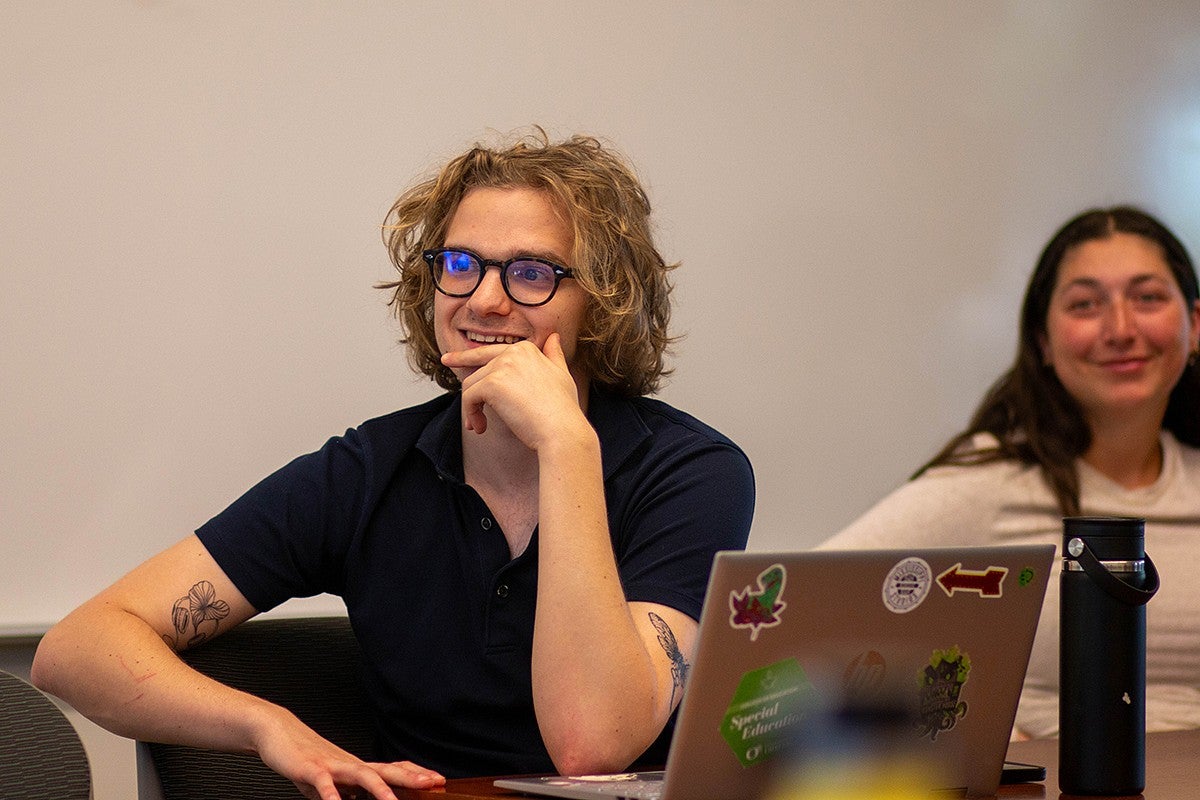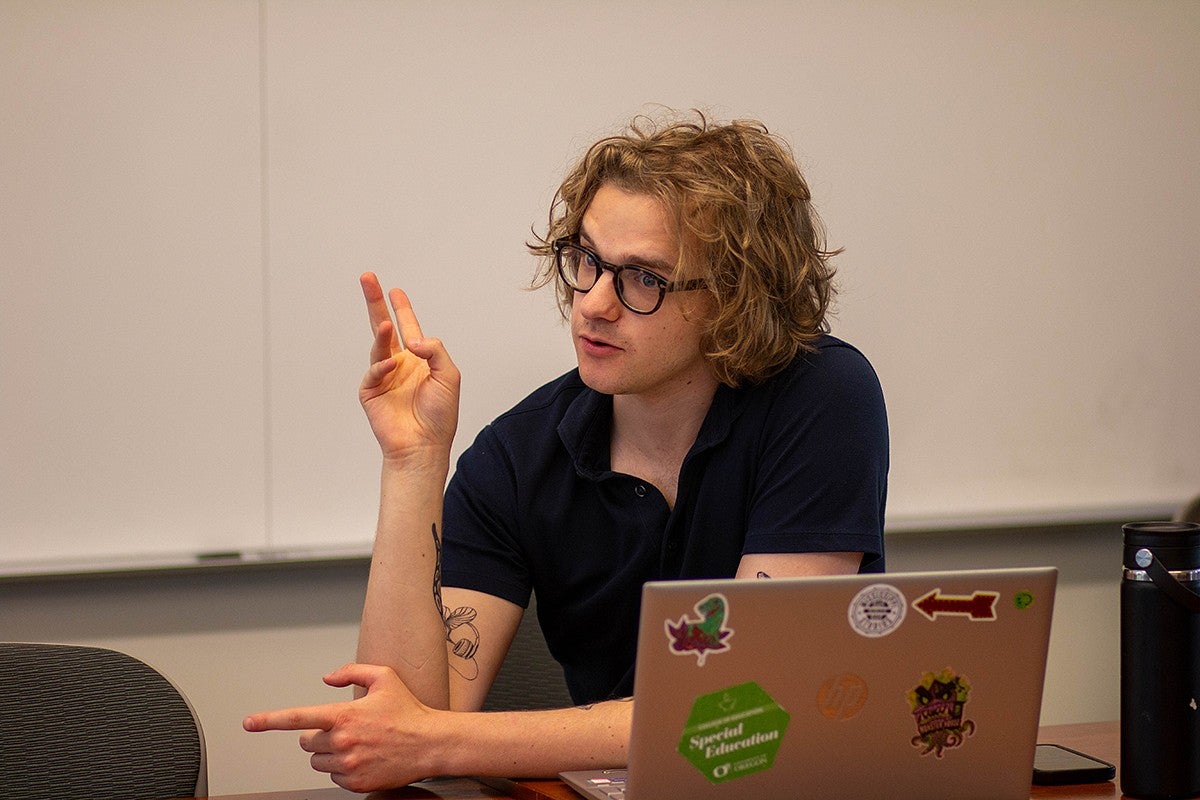
Learning in his own way
Elias Roessler remembers taking his first special education class when he was a sophomore. “The class was asynchronous, with close to no accommodations,” he recalls.
His textbook was filled with outdated terms and pictures that made Roessler’s blood boil. “I was like, this is something that I’m not OK with,” he says. “It inspired me to continue in the (education track) to make a change in the field.”
Roessler has personal stakes in his chosen field. Along with being passionate about the subject, he has suffered at the hands of educators who didn’t provide him with the accommodations he needed. His work as an undergraduate at the University of Oregon and within the Clark Honors College has allowed him to explore new ways to approach making improvements to special education.

Elias Roessler
Major: Education
Minor: Special Education
Thesis: “Barriers for Implementing Universal Design for Learning in K-12 Classrooms”
Describe your experience at the CHC: Constantly changing
One decision that made all the difference in college: Sophomore year, when I declared my major in education and had to take my first special education courses.
Advice on the thesis project: I can’t tell someone not to stress about it, but you’re not completely on your own working on it. Communicate with your advisors and be honest with them.
Advice to incoming first-year students: Just try as many different things as you can. You can find ways to integrate your interests into almost anything.
This summer, I can’t wait to: Sleep.
What I’ll miss about the UO: The campus is really nice. There are a lot of nice, quiet places to go.
I’m grateful for: Having my own space and place to live.
What’s next: I’m taking a gap year to work and save up money, and then I’m going to grad school for special education.
School wasn’t always a thing that carried his interest, he says. “In elementary school and up until middle school, there would be times when I was not interested in a project and would put my own spin on it and get a bad grade,” he says now. It wasn’t that Roessler didn’t want to learn. But if he wasn’t interested, he just wouldn’t do the necessary work to complete his assignments.
He remembers a project he had to do for a history class in middle school. It was a paper on the Gregorian era in England. Roessler found that he was interested in the pirates from that time, and he built a model ship out of cardboard. But his teacher didn’t like the connection he tried to make. “That wasn’t what they were looking for so I got a C,” he says.
His struggles continued into high school. His family moved to England for a five-year stint, and the strict, punishment-heavy education system structure there was hard for Roessler to navigate.
The anxiety that surrounded school became his motivation. He turned in assignments, paid attention, and became a successful student. But when he moved back to Portland in time for 10th grade, he felt like a social outcast.
Roessler didn’t know anyone. He was used to wearing a school uniform in England, but in Portland the kids dressed themselves. “I’d just end up rolling out of bed in my pajamas and going in those because I didn’t want to think about it,” he says.
Although he didn’t have the best middle and high school experiences, Roessler did take away one thing that he loved from his teenage years: music. In England, he was able to sign up for individual instrument lessons through his school. “Once a week, you’d get taken out of class for 30 minutes for a music lesson,” he remembers. “I’d use a school guitar every Wednesday afternoon.”


He continued to play guitar throughout high school, using it as an outlet for his stress and anxiety. When he came to the University of Oregon, he wanted to get involved in the music scene and found a channel in house shows across Eugene. His band, “Noisebloom,” broke up in November 2023, but he remembers his time with them fondly.
“There’s something about loud music that just helps me focus, zone in, be myself,” he says. “You feed off the energy at house shows, both in the crowd and on stage. It’s infectious.”
Everything shifting into place
Roessler had subconsciously been looking for that focus his entire life. When he was diagnosed with ADHD during the COVID-19 pandemic, it felt like a missing puzzle piece shifted into place. “The diagnosis was not shocking, but it was validating,” he says. All of the times when he couldn’t focus on his schoolwork suddenly made sense.
“There were points after I was diagnosed when I was kind of angry because I thought it was going to affect my life a lot more than it did,” Roessler says. The main thing that changed was that he started taking Adderall.
Sometimes, he didn’t have access to Adderall because of national shortages. Whenever he was off the medications, he felt sluggish, irritable, and not able to focus. But when he was on it, it helped his collegiate journey. “I just felt so able to focus,” he says.
He worked at the Vivian Olum Child Development Center, a preschool near the UO campus, connecting with children who need more attention than others. He was also part of the Nese Lab, which works to develop new ways to enforce rules in the classroom without utilizing suspensions or other non-inclusive learning practices.


These campus jobs fed directly into Roessler’s thesis, “Barriers for Implementing Universal Design for Learning in K-12 Classrooms” The idea comes from the basis of universal design for architecture, a movement to make spaces accessible for all. “It’s this idea that there’s no such thing as an average learner, so we have to have multiple ways of engaging with a student to get them engaged,” Roessler explains. “To ensure that students with different needs, when they come into the classroom, they have their needs met.”
He remembers his own experience in the classroom as a child and wants to help fix the gaps in the current educational system. “Especially the younger kids that I work with, a lot of the time they don’t have the language to describe what they need,” he says. “It’s a very relatable experience to me, to just be completely over or understimulated in the classroom.”
When he defended his thesis, a number of his mentors, friends and others attended. He even had some of the parents of the children that he works with at the center show up. “It was scary, but it felt good,” he says. “It’s my research, so I really knew what I was doing.”
Alison Schmitke, the undergraduate degree program director at the UO’s College of Education, attended Roessler’s thesis defense. She had Roessler in a course that examined basic assumptions underlying curriculum development in K–12 schools. During and after that course period, Roessler would visit her and ask for advice on his thesis.
“Elias is a problem solver, clever, a fast thinker, and approachable,” Schmitke says. She enjoyed the way he blended his thesis topic with what they covered in class. “The project was a great, deep dive into why universal design for learning isn’t actually universal” for all learners.
His plan after graduation is to take a gap year to work and save money. Then, in Fall 2025, he wants to attend graduate school to get a master’s in special education.
“I had to work so hard to get to the place I am right now in education, having ADHD,” he says. “I want to break down some of the barriers that I faced for the next generation.”

